Campaign launched to promote women in sound system culture
We catch up with Notting Hill Carnival pioneer Linett Kamala about her aim to train the next generation of women sound system operators

Notting Hill Carnival pioneer Linett Kamala has launched a new mentorship programme supporting women in sound system culture.
The Original Sounds Collective, in collaboration with Guinness, will run a series of workshops from September through to March 2024, teaching participants about all aspects of sound system culture. The project aims to address the gender imbalance in a historically male dominated sound system scene.
The campaign will include close mentorship from Lion Vibes record store employee Dubplate Pearl, Killerwatt Sound System co-manager Ella’D, and Kamala, who was one of the first women to DJ at Notting Hill Carnival in the early 1980s. It hopes to train the next generation of women sound system operators, and to promote their presence at Notting Hill Carnival next year. Applications for the programme opens Aug 28th via Kamala‘s Instagram page.
In a statement, Kamala said: “Women have paved the way within Carnival culture in the U.K. since it began, in fact, Notting Hill Carnival was founded by a female community activist, Rhaune Laslett in 1966. Yet, within sound system culture we still see a disparity between men and women when it comes to opportunities and exposure, as the leading figures are predominantly male. That’s why initiatives like this are so vital to changing the narrative and wouldn’t be possible without Guinness’ shared culture and commitment to supporting the past, present and future women of Carnival.”
Kamala sat down for a chat with DJ Mag ahead of this year’s Notting Hill Carnival to talk about the new programme, her ongoing Sound System Futures campaign and the other projects she’s run over the past year — including a Windrush 75 celebration at the British Museum and ‘Link Me At The Sound System’, her inaugural Carnival warm-up party. Read the Q&A below.
Hey Linett, you already have a mentorships programme Sound System Futures, which you set up last year. What was the idea behind the Original Sounds Collective?
“I’ve always been quite vocal, visible, trying to bring in opportunities for underrepresented groups within the culture and I thought, if there’s one area that we could change, women at Carnival, this would be a good starting point.
“There’s many other groups I feel are underrepresented so I don’t think we will be stopping here, but if you do any research in this country on sound system culture, very few females come up, yet they’ve always been there, they’ve been around. So I thought, let’s celebrate some of the women that are already at Carnival, such as Ella D, who was pretty much born into sound system culture, as well as those who aren’t within sound system culture, such as [Dubplate] Pearl, an absolute Superstar — who do sound systems get their records from? Who do they get their advice from? Pearl.
“So it’s a starting point, but the driver for me is about broadening and championing voices in sound system culture that are not as visible — women and LGBT+. The longer term goal is that there isn’t even a need for programmes like this, but we’re not there yet, which is why we need to have interventions, that’s my view.”
What will the mentorship involve?
“It’s gonna be very much driven by what comes through in the application process. It just depends on what people want to experience or learn about. For example, somebody might want to shift from playing digital to vinyl, or vice versa, someone might want to learn more about building sound systems with people who’ve done builds. It could also be an opportunity for someone who wants to work more on the event side of things. It’s going to be very much driven by the needs of the participants — the key thing is that we want to have an impact at Carnival next year.”
And what’s the age range?
“It’s 25+ — someone might be a bit older, but they still want to be developed and I think that’s important, particularly for women. Some of us, due to other commitments in life, start a bit later, so that’s why there isn’t an upper threshold. You could be someone who’s been around, but then kind of paused and want to get back into things, as well as someone who’s just started out. Lin Kam Art Sound Systems Futures does have a cap at 30 but in this programme we want to work with a mixture of ages.”
Speaking of Sound System Futures — what came of the first cohort? What are they up to?
“There were nine participants and they’re all still part of the programme I’m proud to say. Naim Junior and Bolo Joey opened for David Rodigan and Pasta Kebab supported the production for a closing party in Ibiza. Some have been involved in supporting Lin Kam Art small community festivals, Naim Junior and Pastakebab have been booked at festivals and put on their own events, like Kieran. Naim has gone into training in event management, Kanye into sound engineering and a number of those on the programme were involved in the behind the scenes production of Windrush 75 at the British Museum. Chlxxe and SHVN have been training people with Pioneer DJ and at On the Rise DJ Academy. People are getting solid bookings.”
And how about this year’s cohort?
“There’s seven of them this year and they all played a live set on Saturday for G-Shock Radio, and the other day we went down to Felt Sound System for them to get more of a behind the scenes feel of running a quality sound system. This week they’ll also be attending the British Associations Sound Systems meeting and then they’ll be assigned to different sound systems across the weekend.
“I definitely hope that they have an impact at Carnival this year. They’ve already done brilliantly with the live stream — I was super impressed. I hope they learn more about all areas of sound systems: management, production, health and safety, the legal aspects, or even how to build a sound — I’m really interested in keeping that part of the tradition and how we can revive that within Carnival. It’s also been lovely seeing how they’ve connected with last year’s group.”
If I remember correctly, you also collaborated with Pxssy Palace last year, inviting them to perform with the Disya Generation Sound System.
“Yeah Pxssy Palace — they absolutely smashed it. They were greatly received by the crowd and that’s why I want to continue to take up space at Carnival. I don’t even know what’s driving me to be honest, I just don’t see why more people can’t have the opportunity. At the moment I am the only visible public voice right now, but hopefully it will give more people confidence to show allyship — I’m just dreaming of the day when it’s not a thing.”
You’ve said a number of times that Notting Hill Carnival was founded by a female community activist, Rhaune Laslett, but most people think it was Claudia Jones.
“Yes and I can see why. Claudia Jones is credited as putting on the first indoor carnival in the UK, and that was televised by the BBC, but Claudia Jones was an activist, so when Kelso Cochrane was murdered, she helped to raise funds for the legal campaign. So maybe that’s why people make the link, but she didn’t start Notting Hill — it was Rhaune Laslett.”
Can you tell us a bit more about Rhaune Laslett?
“Yeah, she’s my absolute inspiration. Last year, I did a mural on her outside Studio West Gallery during carnival, because I wanted people to know who was one of the mothers of Notting Hill Carnival which was then called the Notting Hill Festival. It’s a shame that she’s not given credit. She was of Indigenous American and Russian heritage and she wanted to find a way of bringing the community together. She had this vision that started with the children. She worked with the Caribbean community and the London Free School to put on this parade, children of all nationalities, and because it started with children that’s why they call Sunday Children’s Day. When people like Muhammed Ali came to London, they were brought to see her. He visited her in May 1966. There’s a picture of him with a huge crowd outside the children’s playgroup she set up at 34 Tavistock Crescent. That street doesn’t exist anymore, but yeah, she was the principal organiser up until 1969. “
Tell us more about your Carnival warm up party — what can people expect?
“That’s this Thursday at the Notting Hill Arts Club — it’s called Link Me At The Sound System, which is also the title of a group exhibition that I’m part of, launching this week at the Harlesden High Street Gallery. The party will feature the Lin Kam Art Sound System Futures DJs — from the new cohort and last year — and we’re going to be bringing down stacks from the Felt Sound System. I guess this is the first time that people will be able to share and experience our next-gen DJs before they hit the streets over Carnival Weekend.”
Final question — you put on an event at the British Museum for Windrush, how was that?
“Yeah it was called ‘Windrush 75: Jamaican Sound System Culture’. That was historic — we brought some stacks down to the British Museum and created a whole programme celebrating the gift of sound system culture from the Windrush generation on — it’s an integral part of British history. We had film screenings, talks, workshops, giant dominoes — but the bit that was the most fun was the dancing outside, with stacks on the lawn. It was just beautiful. You don’t have to put this in but this is facts: there were two things happening in London that day. There was Beyonce and there was Lin Kam Art at the British Museum. We had to lock off at 5 [pm] but people were still coming. People turned up with their babies and I kid you not — there was an 80-year-old woman who reached by herself all the way from across London. Sure there are different views on the British Museum, but my view was: we’re bringing the culture here and taking up space. We had four generations there, it was beautiful.”
Catch Kamala at Powis Square this Carnival Weekend, where she’ll be producing the Disco Hustlers Sound System, showcasing next gen DJs on the Sunday and the Original Sounds Collective on Monday.
Revisit DJ Mag’s long-read feature on the history of UK sound system culture here.
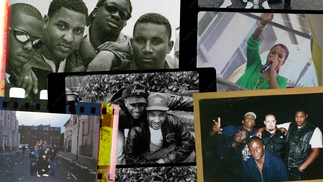
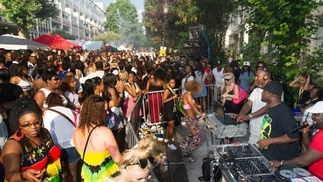
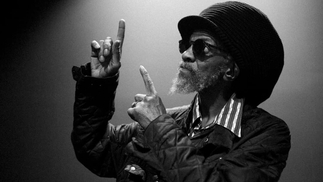
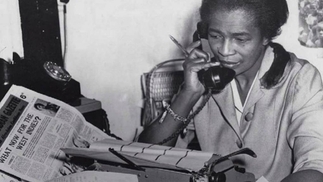
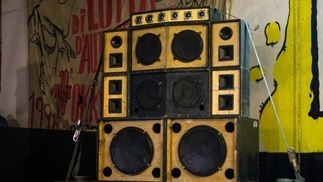
.jpg?itok=WuHtaiaG)